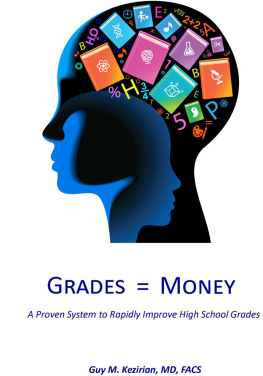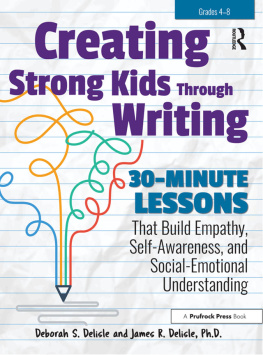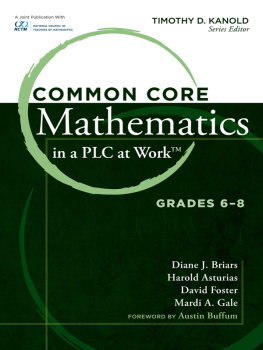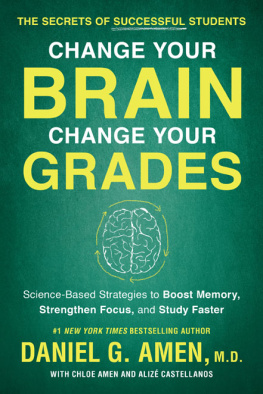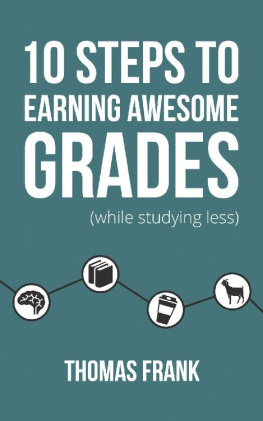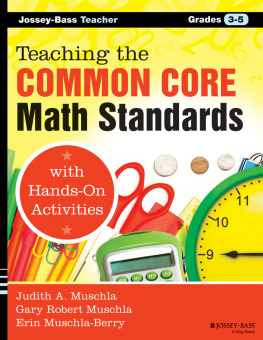
Copyright 2013 Guy M. Kezirian
All Rights Reserved
First Printing: April 2013
10 9 8 7 6 5 4 3 2 1
ISBN: 1481258443
ISBN 13: 9781481258449
eBook ISBN: 978-1-62347-900-8
Library of Congress Control Number: 2012923692
Dedicated to Robert M. Rochefort,
an inspirational teacher and true friend.
TABLE OF CONTENTS
.
You have to expect things of yourself before you can do them.
Michael Jordan
Money is important.
Money may not buy happiness but it does buy food, clothes, cars, and the many other necessities and comforts of life. Anyone who says money is not important is probably not paying the bills.
Because money is important, grades are important. Good grades will make it possible to earn good money. Your grades may not make you money today, during high school, but they will later on. Good grades result in college admission, scholarships, job offers, and other opportunities.
What kind of lifestyle will your grades purchase? Will they make it possible to buy nice cars, clothes, and good food? Will they support your hopes and dreams?
Not everyone can be a straight-A student, but most students are far more intelligent than their grades would indicate. Do your grades reflect your potential? If not, do you know why?
Grades measure academic performance, not intelligence. Grades are based on exam scores and whether the schoolwork matched the teachers expectations. They are not based on a students potential, desire, or intelligence.
In turn, the ability to perform academically relies on skill. Skills are based on techniques, which can be learned. Students who earn good grades are not necessarily smarter. They just have good learning skills.
This book will teach you the skills and techniques you need to earn good grades.
Even though grades do not measure intelligence, students are often labeled as smart, not so smart, or even slow based on their grades. These labels can have lasting and often damaging effects that can limit opportunities both during high school and after graduation.
The labels often become a self-fulfilling prophesy, too. Poor grades lead to low morale, which leads to disinterest and illustrates how grades impact a students self-image and affect future performance. This cycle is all too familiar to under-performing students.

The purpose of this book is to break the cycle of academic underperformance and move students to the right side of the diagram to bring grades in line with ability. The skills needed to perform well at school are developed through a process called Active Learning.
Active Learning gives students control over the learning process. It not only makes it possible to earn good grades; it develops skills that are useful throughout life.
The most difficult part of becoming an active learner is acknowledging the need to do so. This takes maturity, resolve, and confidence. So, congratulations! You have completed the hardest step and have overcome the emotional resistance to change. The rest of the process is straightforward.
I wish you every success.
Guy M. Kezirian, MD, FACS
Education is an ornament in prosperity and a refuge in adversity.
Aristotle
Education is like a ladder. How high we climb determines our level in society and directly impacts how much money we will earn. It takes good grades to move up the ladder. Depending on the level, moving up might mean advancing to the next grade, being accepted into a university, winning a scholarship, or landing a job. Good grades are what make it possible to climb higher. Grades unlock doors and create opportunities.
The picture on the next page illustrates this concept with real numbers. Notice how income increases with each level of education. Society puts a dollar value on school achievement. On average, the higher you go, the more you earn.
SKILLDEVELOPMENTTIPS
This book is written for students.
Parents, teachers, and friends can support students by reading it, too, but Active Learning requires students to engage.
Skill Development Tips and Chapter Summaries are provided throughout this book to guide students on how to proceed. Readers can use these tips to ease into the program and avoid feeling overwhelmed by excessive detail.
Trying to compete in the workplace without a degree is difficult. If two people apply for a high-level job and one has a degree and the other does not, the one with the degree is usually going to win.
Of course, not everyone is suited for college. What about jobs that do not require a college education? In that case, technical training may be needed. The ladder metaphor applies equally well to those pursuits. Higher training brings more income.
WHY BOTHER ?
Money is important, and it becomes more important over time. This is especially true when there isnt enough money!
The fact that you are reading this book suggests that you understandperhaps in the back of your mindthat doing well in school matters to your future. Good grades make it possible to advance through the educational system. Grades bring opportunities; opportunities bring income; so grades bring income. The title Grades = Money is not just a metaphor. It is a reality.

Conversely, just as surely as good grades create opportunities, underperformance in school limits them. Underperforming students may not say, I want to work in a boring job or I want to be the first one laid off when the economy goes sour. They may not even understand the connection between grades and opportunity while they are in school. But the consequences eventually surface. College applications are rejected. Scholarship offers are non-existent. Job opportunities are few. Pay scales are low.
Anyone who claims that money doesnt matter probably is not paying the bills, which describes most high school students.
Waiting until after leaving school may be too late. It is common for people who did not do well in high school to find themselves wishing they could go back and change their approach. But of course, this isnt possible. After graduation, high school is over. There is no second chance.
By the same token, it can be difficult for high school students to grasp the long-term impact grades have on the future. Going to a movie is more appealing than doing homework, and spending time gaming is more fun than studying for a test. Movies and gaming are fun, homework and tests can be boring. Friends who are casual students can make it difficult to take school seriously, adding to the problem. Why bother?
Frankly, the immediate consequences for underperforming at school are few. Comments from teachers and parents that you can do better are easy to shrug off. But it is not a sign of weakness to agree with advice when the advice is correct. Doing well in school reflects maturity.
Earning good grades is worthwhile. With few exceptions, any student can earn good grades. It isnt difficult, it just takes skill. Once you know how to do it, earning good grades is easy. This book will show you how.
Understand the value of an education while you are still in school! Take a meaningful step toward self- reliance. Engage as an active learner and school will work for you, not against you.
Next page
